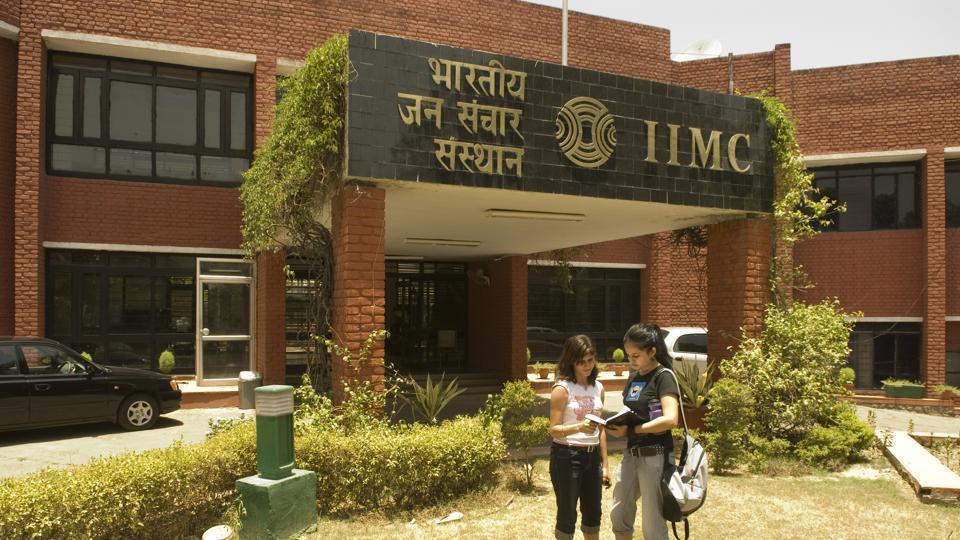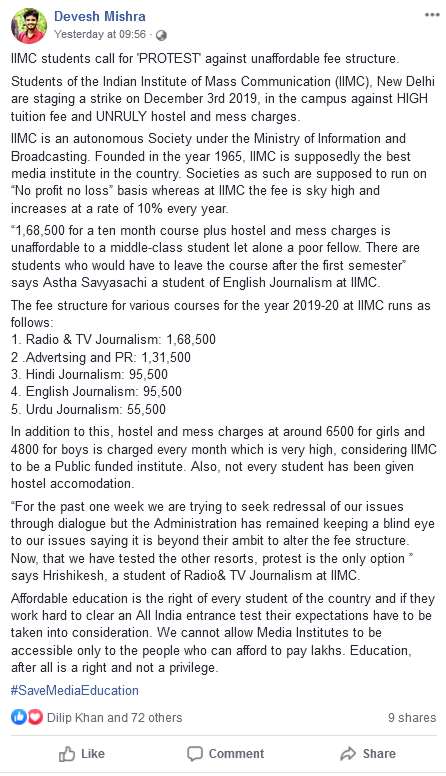
The fight for affordable education taken up staunchly by the students of Jawaharlal Nehru University (JNU) has now spread like wildfire to other students facing oppression by the government. Picking out a leaf from JNU’s book, the students of Indian Institute of Mass Communication (IIMC), New Delhi staged a strike on December 3 against the ‘high’ tuition fee and unruly hostel and mess charges.

IIMC is an autonomous society falling under the umbrella of the Ministry of Information and Broadcasting and it is known to be one of the best media institutes in India. Societies like the IIMC are supposed to run on a no profit, no loss basis, but students say that the fees at IIMC are extremely high and are increased at a rate of 10% every year.
Students also said that the fee for a course in Radio and TV Journalism stands at Rs. 168,500 while the fee for the Advertising and PR course is Rs. 131,500. The Hindi and English Journalism fees are Rs. 95,000 and the fee for Urdu Journalism stands at Rs. 55,500.
These are just the course fees, say students. The hostel and mess charges are pegged at Rs. 6500 for girls and 4800 for boys every month. These charges are extremely high and burdensome, especially for children from economically weaker backgrounds. It also doesn’t help that every student here doesn’t get hostel accommodation and the hostel fee is not in accordance with the quality of the rooms provided.
IIMC is a public funded institution just like JNU and students say that for the past week they have been trying to seek a redressal of their issues but the administration has been turning a blind eye to their issues.
The administration, say the students, is not willing to help as it says that altering the fee structure is beyond their power. Hence, after testing all other avenues, the students have called for a protest.
Hrishikesh, a student of the Radio and TV Journalism course at IIMC said, “We cannot allow media institutes to be accessible only to the people who can afford to pay lakhs. Education, after all, is a right and not a privilege.”
People have come out in support of the students and they are being cheered on by fellow students in their protest.
The protest against hostel fee hike at Delhi’s Jawaharlal Nehru University spread to the neighbouring #IIMC on Tuesday, where students protested against the “unaffordable fee structure”#JNUProtests #IIMCPROTEST #Protests @PrakashJavdekar @narendramodi_in @PMOIndia pic.twitter.com/HPEWhJsxbb
— Brijesh K N Tiwari (@brijeshkntiwari) December 3, 2019
#iimc
Stand in solidarity with students of Indian Institute of Mass Communication in protest against high fees structure in public institutions. Remember, education is not a commodity. #feemustfall pic.twitter.com/ehJLU6RGf1— Richard Kujur (@IamRCHRD) December 4, 2019
#FeesMustFall spreads to JNU’s neighbouring campus. Students of @IIMC_India protest against fee hike. @IndianExpress @ieDelhi pic.twitter.com/MsDOAJJ3GC
— Anya Shankar (@AnyaShankar) December 3, 2019
₹168500 for a ten-month course in addition to hostel & mess charges, that too in public-funded IIMC! How is it justified?
Does the govt think education is a privilege and not a right?
Why are students forced to protest even for basic demands like right to affordable education? pic.twitter.com/DUivVIblUC
— Anupam | अनुपम (@AnupamConnects) December 4, 2019
What the administration says
Edex Live reports that 90 students are part of the protest and though the administration has told them that a faculty-student grievance committee will be formed to address concerns, it is not guaranteed that the students’ demands will be accepted.
A senior IIMC official said that there is going to be an open house scheduled with the students on December 4 to initiate a dialogue. He said, “The Director-General has already met the students. We were to have another meeting on 15th and we expected a reaction from the students only after that. This was quite unexpected. “We have already acceded to a lot of their demands. One of their demand was to stop the 10 per cent hike in the course fee every year. We, in fact, took a suo motto action against this.”
He also added that there was no interim hike in the fee and that the fee mentioned in the prospectus is collected from the students. Stressing on how important higher education was he said, “Usually, freeships were reimbursed against submission of bills. But this year, we made sure that the students got them awarded right after the entrance examination.” He continued, “Fee hikes is a larger debate which isn’t confined to IIMC alone. But, our courses are mostly skill-based and has a large employability potential. They must be treated akin to self-financing courses in a collegiate system.”
Addressing the quality and unavailability of hostel rooms the official said that it indeed was a challenge to accommodate every student, but they were in talks to construct a larger hostel and were awaiting clearance for the same.
It is now widely acknowledged that fee hikes will prove to be the death of education in India. Education spending in India dropped from 1% of the GDP in the NDA government’s first budget in 2014 to 0.62% in 2017-18. Currently, both the State and Central governments are spending only 3% of the GDP on education.
As if the threat of privatisation wasn’t enough, the government’s arbitrary behaviour with regards to fee hikes is just appalling. Leaving out the most vulnerable sections of society from their rightful share of education, is that the aim of the government?
With aspirational talks about India Rising and it becoming the fastest growing trillion dollar economy, how is the government going to achieve it by keeping bright young minds out of the process?
Related:
Why fee hikes are the death of education in India
Student Movement and Public Education
JNU VC Deserves Compliments — For Passionate Zeal To Destroy Varsity & His Loyalty To Masters
Ahmedabad students sign huge banner in support of JNU anti-fee campaign
‘Stand by JNU!’ Solidarity Statements from across the world